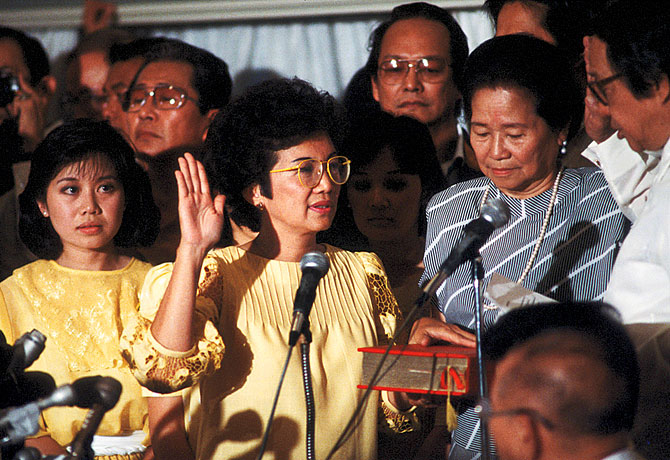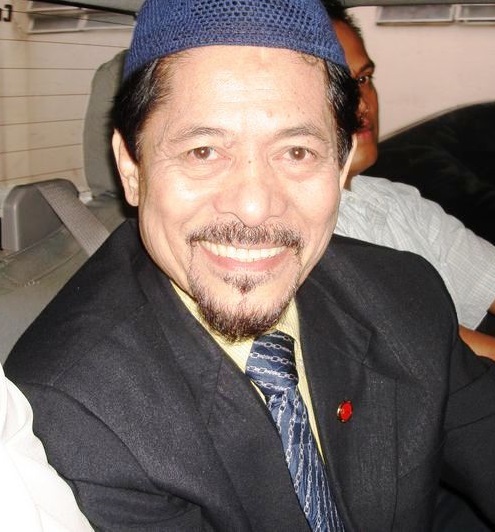|
Dimasangcay Pundato
Dimasangcay Pundato (December 21, 1947 – August 13, 2020) a Muslim Filipino of Maranao descent, known to friends and kin as "Kumander Dimas", was former Moro revolutionary leader and undersecretary of the Office of the Presidential Adviser on the Peace Process. He served for nine years in the now-defunct Office on Muslim Affairs (OMA) under the Office of the President during the administrations of the late President Cory Aquino and former President Fidel V. Ramos. He was Vice Chairman of the Moro National Liberation Front (MNLF) and Chairman of the MNLF Reformist Group, where he negotiated with the Ramos administration in peace talks with Moro rebel front leaders. Career Moro National Liberation Front In the fight against the dictatorship of President Ferdinand Marcos, Pundato led the Maranao forces of the MNLF from 1973 to 1985, eventually becoming MNLF Vice-Chairman in 1978. He also fought internally for reforms in the rebel movement. Among the three pillars of the MNLF, Pu ... [...More Info...] [...Related Items...] OR: [Wikipedia] [Google] [Baidu] |
Marawi
Marawi, officially the Islamic City of Marawi (Maranao: ''Inged a Marawi''; fil, Islamikong Lungsod ng Marawi), is a 4th class component city and capital of the province of Lanao del Sur, Philippines. According to the 2020 census, it has a population of 207,010 people. Marawi is located upon the shores of Lake Lanao. It is primarily inhabited by the Maranao people. The city is also called the "summer capital of the south" due to its higher elevation and cooler climate, a nickname it shares with Malaybalay. On May 23, 2017, the city suffered extensive damage during the Battle of Marawi as militants affiliated with the Islamic State of Iraq and the Levant invaded the city and engaged in a massive urban gunfight. The ensuing battle lasted until October 23, 2017, when Defense Secretary Delfin Lorenzana announced the ending of the battle. Major damage of the city was mostly caused by airstrikes carried out by the Philippine Air Force in an attempt to eliminate the militants. Hi ... [...More Info...] [...Related Items...] OR: [Wikipedia] [Google] [Baidu] |
Cory Aquino
Maria Corazon "Cory" Sumulong Cojuangco-Aquino (; ; January 25, 1933 – August 1, 2009) was a Filipina politician who served as the 11th president of the Philippines from 1986 to 1992. She was the most prominent figure of the 1986 People Power Revolution, which ended the two-decade rule of President Ferdinand Marcos and led to the establishment of the current democratic Fifth Philippine Republic. Corazon Aquino was married to Senator Benigno Aquino Jr., who was one of the most prominent critics of President Marcos. After the assassination of her husband on August 21, 1983, she emerged as leader of the opposition against the president. In late 1985, Marcos called for a snap election, and Aquino ran for president with former Senator Salvador Laurel as her running mate for vice president. After the election held on February 7, 1986, the Batasang Pambansa proclaimed Marcos and his running mate Arturo Tolentino as the winners, which prompted allegations of electoral fraud ... [...More Info...] [...Related Items...] OR: [Wikipedia] [Google] [Baidu] |
Filipino Muslims
Islam was the first-recorded monotheistic religion in the Philippines. Islam reached the Philippines in the 14th century with the arrival of Muslim traders from the Persian Gulf, southern India, and their followers from several sultanates in the wider Malay Archipelago. The first missionaries then followed in the late 14th and early 15th centuries. They facilitated the formation of sultanates and conquests in mainland Mindanao and Sulu. Those who converted to Islam came to be known as the Moros, with Muslim conquest reaching as far as Tondo that was later supplanted by Bruneian Empire vassal-state of Maynila. Muslim sultanates had already begun expanding in the central Philippines by the 16th century, when the Spanish fleet led by Ferdinand Magellan arrived. The subsequent Spanish conquest led to Catholic Christianity becoming the predominant religion in most of the modern-day Philippines, with Islam becoming a significant minority religion. In the 21st century, there i ... [...More Info...] [...Related Items...] OR: [Wikipedia] [Google] [Baidu] |
2020 Deaths
This is a list of deaths of notable people, organised by year. New deaths articles are added to their respective month (e.g., Deaths in ) and then linked here. 2022 2021 2020 2019 2018 2017 2016 2015 2014 2013 2012 2011 2010 2009 2008 2007 2006 2005 2004 2003 2002 2001 2000 1999 1998 1997 1996 1995 1994 1993 1992 1991 1990 1989 1988 1987 See also * Lists of deaths by day The following pages, corresponding to the Gregorian calendar, list the historical events, births, deaths, and holidays and observances of the specified day of the year: Footnotes See also * Leap year * List of calendars * List of non-standard ... * Deaths by year {{DEFAULTSORT:deaths by year ... [...More Info...] [...Related Items...] OR: [Wikipedia] [Google] [Baidu] |
Philippine Daily Inquirer
The ''Philippine Daily Inquirer'' (''PDI''), or simply the ''Inquirer'', is an English-language newspaper in the Philippines. Founded in 1985, it is often regarded as the Philippines' newspaper of record. The newspaper is the most awarded broadsheet in the Philippines and the multimedia group, called The Inquirer Group, reaches 54 million people across several platforms. History The ''Philippine Daily Inquirer'' was founded on December 9, 1985, by publisher Eugenia Apóstol, columnist Max Solivén, together with Betty Go-Belmonte during the last days of the regime of President Ferdinand Marcos, becoming one of the first private newspapers to be established under the Marcos regime. The ''Inquirer'' succeeded the weekly ''Philippine Inquirer'', created in 1985 by Apostol to cover the trial of 25 soldiers accused of complicity in the assassination of opposition leader Ninoy Aquino at Manila International Airport on August 21, 1983. Apostol also published the '' Mr. & Ms. Spec ... [...More Info...] [...Related Items...] OR: [Wikipedia] [Google] [Baidu] |
Nur Misuari
Nur Misuari ( Tausug: ''Nūr Miswāri'', born Nurallaji Pinang Misuari; March 3, 1939) is a Moro Filipino revolutionary and politician, founder and leader of the Moro National Liberation Front. Early and Personal life Nur Misuari was born on March 3, 1939, in Tapul, Sulu, Philippines. The fourth of ten children, his parents were of Tausūg- Sama descent and came from Kabinga-an, Tapul Island. His father was Saliddain Misuari, who worked as a fisherman, and his mother was Dindanghail Pining. Nur Misuari is a direct descendant of Panglima Mahabasser Elidji, a Tausūg warrior and representative from the Sultanate of Sulu who he claims helped the Sultanate of Brunei forces under Sultan Muhyiddin during the civil war in northern Borneo, after which the eastern part of Sabah was rewarded to the Tausūgs by Sultan Muhyiddin. Misuari's father moved their family from Tapul to Jolo, Sulu when he was still young. He attended Jolo Central Elementary School from 1949 to 1955 and studied ... [...More Info...] [...Related Items...] OR: [Wikipedia] [Google] [Baidu] |
Ferdinand Marcos
Ferdinand Emmanuel Edralin Marcos Sr. ( , , ; September 11, 1917 – September 28, 1989) was a Filipino politician, lawyer, dictator, and kleptocrat who was the 10th president of the Philippines from 1965 to 1986. He ruled under martial law from 1972 until 1981 p. 189. and kept most of his martial law powers until he was deposed in 1986, branding his rule as "constitutional authoritarianism" under his Kilusang Bagong Lipunan (New Society Movement). One of the most controversial leaders of the 20th century, Marcos's rule was infamous for its corruption, extravagance, and brutality. Marcos gained political success by claiming to have been the "most decorated war hero in the Philippines", but many of his claims have been found to be false, with United States Army documents describing his wartime claims as "fraudulent" and "absurd". After World War II, he became a lawyer then served in the Philippine House of Representatives from 1949 to 1959 and the Philippine Senate from ... [...More Info...] [...Related Items...] OR: [Wikipedia] [Google] [Baidu] |
Fidel V
{{disambiguation ...
Fidel most commonly refers to: * Fidel Castro (1926–2016), Cuban communist revolutionary and politician * Fidel Ramos (1928–2022), Filipino politician and former president Fidel may also refer to: Other persons * Fidel (given name) Film * ''Fidel'' (2002 film), a 2002 mini-series by David Attwood about Castro * ''Fidel'' (2009 film), a 2009 Filipino indie film * '' Fidel: The Untold Story'', a 2001 a documentary about Castro Other uses * Fidel, a writing system used in Ethiopia and Eritrea, see Ge'ez script * Vielle, a musical instrument and forerunner of the fiddle * Fidel (imprint), an imprint of VDM Publishing devoted to the reproduction of Wikipedia content See also * Fidèle (other) Fidèle or Fidele may refer to: * Fidèle (album), ''Fidèle'' (album), a 1981 album by Julio Iglesias * Fidèle (dog) (2003–2016), a yellow Labrador and tourist attraction in Bruges, Belgium * Bourg-Fidèle, a commune in the Ardennes department ... [...More Info...] [...Related Items...] OR: [Wikipedia] [Google] [Baidu] |
Office On Muslim Affairs
The National Commission on Muslim Filipinos ( fil, Pambansang Komisyon sa mga Pilipinong Muslim; ar, اللجنة الوطنية لمسلمي الفلبين : ''allajnat alwataniat limuslimi alfilibiyn'') is a government agency in the Philippines, whose objective is to promote the rights of Muslim Filipinos and to make them active participants in Philippine nation-building. NCMF is one of the 12 agencies, formerly from the Office of the President which now placed under the supervision of the Cabinet Secretary, based on Executive Order No. 1 issued by President Rodrigo Duterte on July 4, 2016. On October 31, 2018, the Commission, through Executive Order No. 67, was transferred to the Department of the Interior and Local Government along with the National Youth Commission and the Philippine Commission on Women as part of the reorganization of the Office of the Cabinet Secretary. History On July 23, 1979, President Ferdinand Marcos signed Executive Order No. 549 creating the ... [...More Info...] [...Related Items...] OR: [Wikipedia] [Google] [Baidu] |
Lanao (province)
Lanao was a province of the Philippines from 1914 to 1959. Today, the province comprises Lanao del Norte and Lanao del Sur. History The term "Lanao" is derived from a Maranao word "Ranao" meaning a body of water. "Meranau" means lake dweller. They are the natives of the place occupying the land around Lake Lanao, which is situated at the central part of Lanao del Sur. Lanao, applies to the entire area before its division. When it was divided into two provinces, the southern portion became Lanao del Sur and the northern part became Lanao del Norte. Dansalan, Marawi City's old name, was explored by the Spaniards as early as 1639. It is said that at that time, Marawi was already the citadel of Malayan-Arabic culture in Mindanao. Feeling the pulse of strong refusal among its inhabitants to adopt Christianity, the Spaniards abandoned the project of colonizing the area. Dansalan, physically speaking, would have satisfactorily qualified to become a town or municipality during the ti ... [...More Info...] [...Related Items...] OR: [Wikipedia] [Google] [Baidu] |
Moro People
The Moro people or Bangsamoro people are the 13 Muslim-majority ethnolinguistic Austronesian groups of Mindanao, Sulu, and Palawan, native to the region known as the Bangsamoro (lit. ''Moro nation'' or ''Moro country''). As Muslim-majority ethnic groups, they form the largest non-Christian population in the Philippines, and comprise about 5% of the country's total population, or 5 million people. Most Moros are followers of Sunni Islam of the Shafiʽi school of fiqh. The Moros were once independent under a variety of local states, including the Sultanate of Sulu, the Sultanate of Maguindanao, and the Confederation of sultanates in Lanao; withstanding repeated Spanish invasions, the Moro states remained de facto independent up until the Moro Rebellion of the early 20th century. Upon Philippine independence in 1946, the Moros continued their struggle for self-determination against a predominantly–Christian Philippines, culminating in a decades-long insurgency of armed rebe ... [...More Info...] [...Related Items...] OR: [Wikipedia] [Google] [Baidu] |





